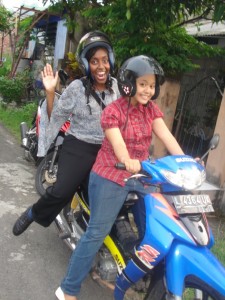 When I first arrived in Surabaya, Indonesia, as a Fulbright English Teaching Assistant I expected to visit the local zoo, learn Bahasa Indonesia (the national language), and become familiar with my new home. I did not, however, expect to learn how to swim, hike to a waterfall, or encounter people who were genuinely confused about my nationality. All of this happened — and so much more.
When I first arrived in Surabaya, Indonesia, as a Fulbright English Teaching Assistant I expected to visit the local zoo, learn Bahasa Indonesia (the national language), and become familiar with my new home. I did not, however, expect to learn how to swim, hike to a waterfall, or encounter people who were genuinely confused about my nationality. All of this happened — and so much more.
I also met people who changed my life forever. My host family treated me like a daughter and thoughtfully answered my questions about Islam and holidays such as Ramadan and Idul Fitri. They also taught me about Indonesian culture and cuisine. Women in my host community shared beauty secrets and lured me, kindheartedly, into getting a makeover. Family friends whisked me away via motorbike to experience the sights and sounds of Surabaya. Nevertheless, none of this happened overnight.
When I first arrived, I was often mistaken as someone from Papua or Africa, but never from America.
Word gradually spread that an American—an African-American—was in town and teaching at a nearby school. That cleared up some confusion. Residents came to understand that I wasn’t being disrespectful when I did not speak. I simply did not know how to respond to their questions, but I soon learned.
Despite having no background in Bahasa Indonesia, students constantly challenged and encouraged me to learn more and more about the language until I got better. I demanded the same of them when it came to learning English.
One student in particular kept me on my toes—Ela Munica. She was a quick study and was always ready to learn more. When Ela invited me to her home, she introduced me to her English protégé, an eight-year-old girl who lived in the neighborhood. While there, Ela confided that she was prepping to apply for a scholarship to study in America. When I left Ela’s home that evening, I was quite inspired by her generosity and continuous drive. I still am.
Prior to leaving Indonesia, Ela insisted that we go golfing. I was an awful golfer but Ela did not seem to mind. Then it dawned on me. Every time I taught, I felt more capable and confident in my abilities. Rarely was I caught off guard when it came to doing something that came naturally to me. The same standard applied on the golf course. Ela was the expert; I was the amateur.
To this day, Ela and I continue to keep in touch. I taught her a thing or two in the classroom and she showed me that while there’s plenty to be taught, there’s so much more to learn.
My advice to future Fulbright English Teaching Assistants is to invite questions. Be respectfully inquisitive during your Fulbright grant. Through posing genuine questions and answering them thoughtfully, deep understandings can be reached. Lastly, be open to teaching, but always be open to listening and learning. This can lead to invaluable experiences for you — and everyone you meet.
Photo: Sierra Carter, 2008-2009, Fulbright English Teaching Assistant to Indonesia, hops on a motorbike with her student Ela
Questions for Sierra about her Fulbright experiences? Feel free to email her at RCarter.AlumniAmbassador@fulbrightmail.org.
